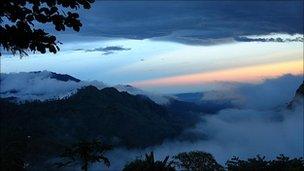UK lifts Sri Lanka travel advice restrictions
- Published

Sri Lanka has many tourist beauty spots
A security assessment carried out by the British High Commission in Sri Lanka has concluded that the whole country is now safe for travellers.
It is the first time in about 30 years that travel restriction advice has been completely lifted.
The British government had previously warned against travelling to northern areas, principally because of the danger of unexploded mines.
The Sri Lankan army defeated Tamil Tiger rebels in May last year.
The rebels were fighting for a separate state for the island's Tamil minority from their heartlands in the north and east of the country.
Their use of suicide bombers, in particular, meant that many countries officially designated them a proscribed organisation.
It also meant that tourists were put off from travelling to the country, which is renowned for having some of the best beaches in South Asia.
The Sri Lankan government has welcomed the lifting of the travel restriction advice.
Caution remains
"This latest change means we no longer advise against travel to any part of Sri Lanka," a High Commission statement said.
"But Britons wishing to travel to the north should be aware that there remains a risk from mines and unexploded ordinance and that they need to obtain permission from the Sri Lankan Ministry of Defence before they travel."
The Foreign Office in London is a little more cautious in its advice to travellers.
It says that a "general threat from terrorism" remains, despite the defeat of the Tamil Tigers.
"The government maintains its state of emergency, under which it has extensive anti-terrorism powers, and increased security measures, including checkpoints and a highly visible military presence, remain throughout the country.
"Isolated attacks cannot be ruled out and could be indiscriminate," it says.